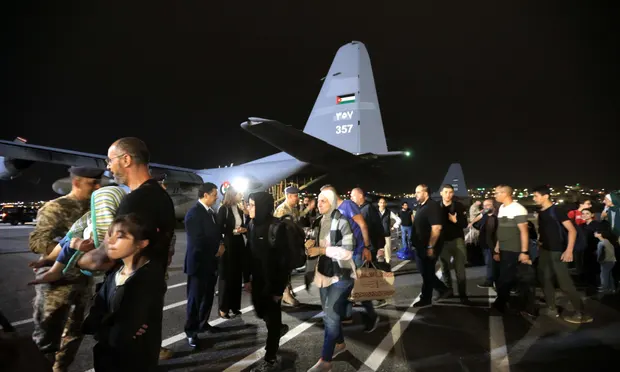The British government is preparing to take advantage of a 72-hour ceasefire agreed by the warring factions in Sudan to evacuate UK nationals from the country, following intense criticism that it had missed a window of opportunity to evacuate more than only British diplomats and their families on Sunday.
Military flights open to British passport-holders would depart from an airfield outside the Sudanese capital, Khartoum, the Foreign Office said. Priority would be given to family groups with children, the elderly and individuals with medical conditions.
The Foreign Office told citizens not to travel to the airfield unless they were contacted, as it warned the situation remained “volatile” and that the ability to carry out evacuations could change at short notice.
It is thought more than 2,000 people, many dual nationals, have contacted the Foreign Office seeking to leave Sudan since violence broke out 10 days ago pitting army units loyal to its military ruler, Gen Abdel Fattah al-Burhan, against the Rapid Support Forces, led by Mohamed Hamdan Dagalo, known as Hemedti.
The foreign secretary, James Cleverly, said: “The UK government is coordinating an evacuation of British nationals from Sudan. We have started contacting nationals directly and providing routes for departure out of the country.”
The Ministry of Defence said RAF transport planes were on their way to the Wadi Seidna airfield, north of Khartoum. The operation would involve A400M Atlas planes, with a passenger capacity of up to 200, and C-130 Hercules, with a capacity of about 120, an official said.
Any airlift would be limited by the size of the airfield, which the UK said on Monday could carry only two Atlas-size planes at a time. It is likely to be shared with countries other than the UK while the ceasefire agreed holds.
Only British passport-holders and immediate family members with existing UK entry clearance are eligible to board the evacuation flights. The Foreign Office said other exit routes were being considered, with two British military ships prepared for a possible evacuation.
British nationals have been warned that all travel within Sudan was “conducted at your own risk”.
It was being stressed that British diplomats would be on the ground to coordinate, suggesting assurances are being given that the British military will not be going through the city.
The announcement of the ceasefire was critical to the decision to attempt the operation.
Sir Nicholas Kay, a former British ambassador to Sudan, warned that the situation during the ceasefire remains “precarious”.
He told BBC Radio 4’s Today programme: “The security situation can change very quickly, the command and control over forces isn’t complete and there is no trust between the two sides so they might kick off again.”
The former diplomat warned that moving around Khartoum could be “very difficult”, with the bridges crossing the Blue and White Nile rivers being controlled by the armed groups.
The US announced on Monday evening that the two opposing forces had agreed a three-day ceasefire. “Following intense negotiation over the past 48 hours, the Sudanese armed forces and the Rapid Support Forces have agreed to implement a nationwide ceasefire starting at midnight on 24 April, to last for 72 hours,” the US secretary of state, Antony Blinken, said.
Previous attempted ceasefires have failed over the course of 10 days of fighting that has so far killed at least 427 people and wounded more than 3,700, according to UN agencies.
Hours before Blinken’s announcement, the UN secretary general, António Guterres, had warned that the fighting could “engulf the whole region and beyond”.
British ministers have been challenged repeatedly to explain how other countries had managed to evacuate at least some of their nationals, and whether the UK had wasted a window of opportunity to extract large numbers on Sunday, during a brief lull in the fighting.
France has airlifted 491 people from 36 countries, including 12 EU nations, to Djibouti since Sunday, according to the foreign ministry. They included two Greeks and one Belgian who had been wounded, as well as the German and Swiss ambassadors, it said.
Two Italian military planes landed in Rome on Monday carrying 83 Italian nationals and 13 citizens of various nationalities, who had first been evacuated to Djibouti.
James Heappey, the UK minister for the armed forces, had said in a briefing on Monday that the UK recognised “the job isn’t done” when it came to rescuing the British and dual nationals trapped in Sudan.


